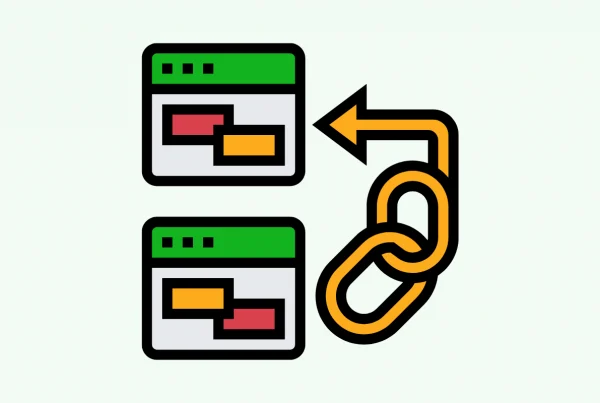Blog article
Best 10 Product Recommendation Tools – Reviewed From Experience

How we chose the top 10 product recommendation engines
- Product Recommendation Options Offered: We evaluated each recommendation engine based on the recommendation engine strategy and options:
- Can you select the products?
- Can you select the users?
- Can you boost specific items?
- Can you choose ready-made templates?
- Pay Attention to the Algorithm: We checked if the recommendations have an advanced machine learning technique behind or are supported with large sets of data and AI technology. That will translate into relevant tailored products for each user increasing conversion rates.
- Does it use large sets of data?
- Does it use 3rd party or 1st party data?
- Does it react in real time?
- A/B Testing Included: We listed recommendation engines that allow you to A/B testing one way or another: Layouts, settings, multiple platforms, devices, etc. There are product recommendation tools that do not offer direct AB testing features but you can use your own analytics and timeframes to test different recommendations placements and test KPIs.
- Industry-specific Recommendations Engine: Are you offering products or services, mass production or custom options, fashion or healthcare? We considered how each search engine is tested in a specific environment. We focused mostly on solutions that serve online retail within consumer products, where we believe these product recommendation engines have better results.
- User-friendly product recommendations engine: Most recommendation engines are full of features, which means that the complexity increases. In many cases, you need front-end development to use the engines to their full potential, but many companies cannot do that. So we also listed engines that require no technical customization so you can use them without any limitations because of a lack of technical knowledge or resources.
- Customer Support: We did not reach all customer support teams of each company that provides product recommendations (only a few of them) and we listed the best ones in terms of service. You might have to experience it for yourself. But we listed the best-rated companies.
The Best Top 10 Product Recommendation Engines for eCommerce
Based on our own experience using these recommendation engines for eCommerce we got the best features, cons, pricing, reviews, and alternatives.
1. Verbolia
Verbolia is a solution designed to improve conversion and engagement rates in your online store. Its product Vmax is focused on paid traffic, and intended to improve the ROAS (or POAS) of your paid traffic campaigns.
Verbolia has a powerful product recommendations engine that works for product pages and also for category pages. Either from Google Ads campaigns or from organic traffic, Verbolia’s product recommendations algorithm will show the most relevant products to the right visitors.
With this solution, you will experience lower bounce rates as well as better cross-selling and upselling rates.
💡 For you: Discover how to reduce the bounce rate of your e-commerce
Top Verbolia’s product recommendations features:
- Tailored Product Recommendations: Verbolia uses a hybrid system to suggest products. It’s based on product data and collaborative data from site traffic. This is used to train machine learning algorithms and to predict which products will be most relevant. On top of this, manual merchandising rules allow marketers to tailor recommendations based on specific business goals and customer insights.
- Automated Layout Testing: Verbolia enables automated layout experiments powered by AI technology. This feature allows you to run automated A/B tests to determine the most effective positions and formats for displaying recommended products. By leveraging performance-driven insights, Verbolia helps you identify and implement the optimal layout that maximizes engagement and conversion rates.
- Integration with eCommerce Platforms: Verbolia seamlessly integrates any eCommerce platforms, enterprise such as SAP Hybris or Salesforce, as well as regular ecommerce platforms such as Shopify or Magento.
- Product Catalog Management: You can connect your online store feed into Verbolia and by adding a small code snippet to the website you can manage all the product displays, A/B testing, and product recommendation rules all from one centralized dashboard.
- Performance Analytics: You get an analytics and insights dashboard to track the impact of product recommendations and landing page optimizations on your eCommerce conversion rates, revenue, and return on advertising spend (ROAS).
💡 Optimize your PPC campaigns with the Best Google Ads Tool Stack
How Verbolia works:
1. Import and map your product feed:
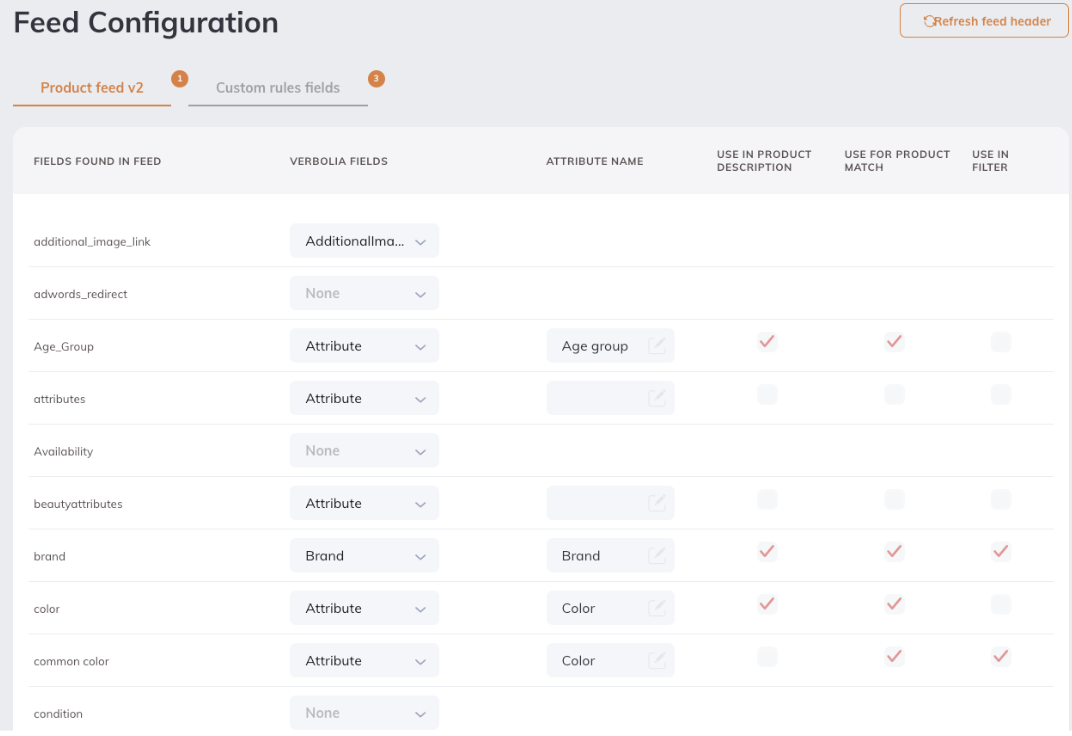
Product feed import stage using Verbolia.
2. Create any product recommendation rules or simply drag and drop to set product positions:
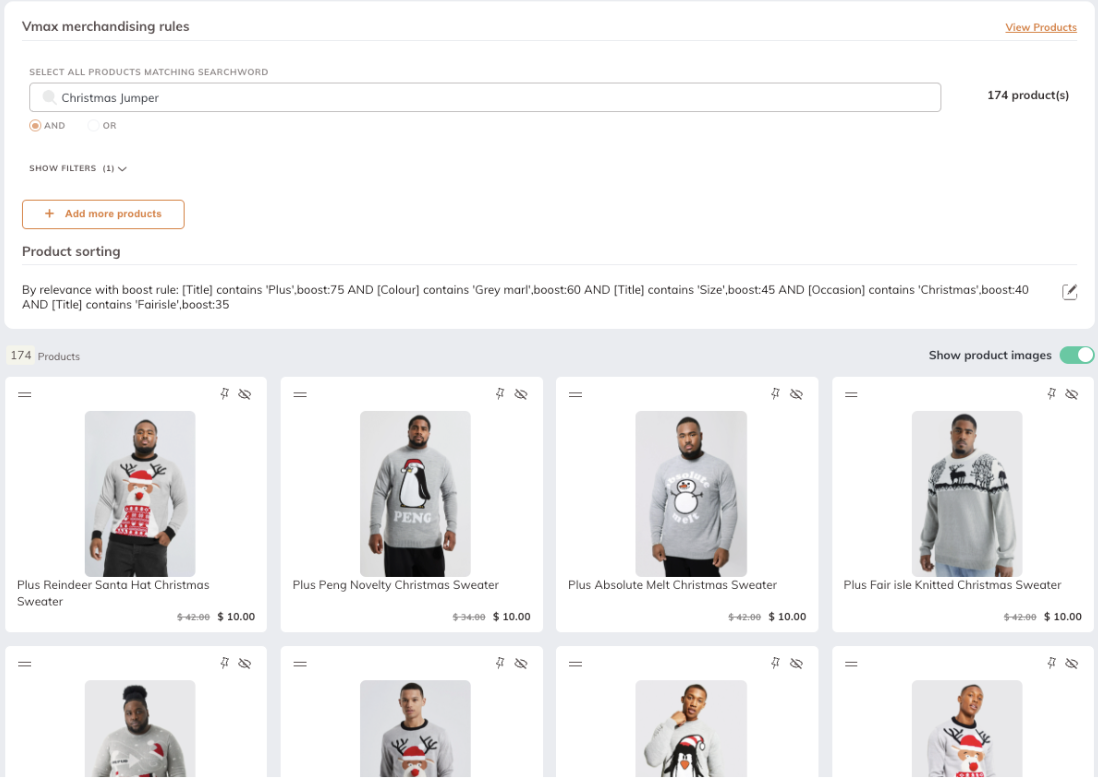
Product recommendation rules creation phase.
3. Monitor and optimize your product landing pages: Using Verbolia’s AI product recommendations engine you will get to analyze the performance of all your product pages using Verbolia’s engine.
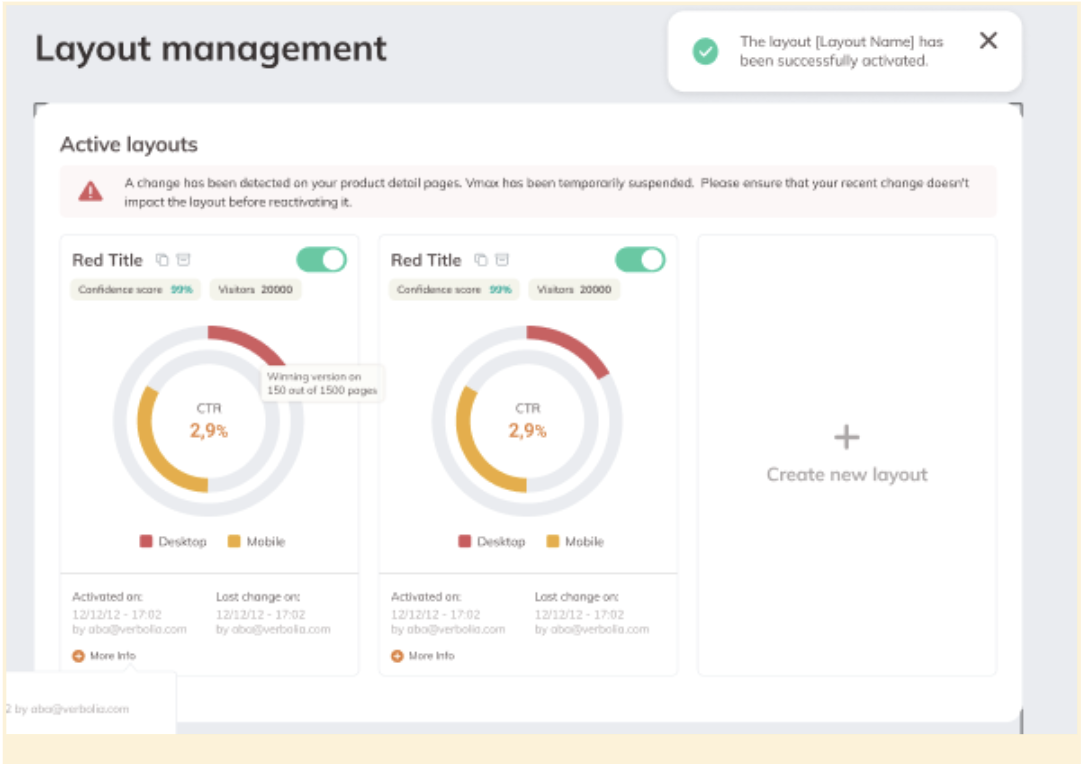
Performance analysis for each layout under test.
You can choose which products will have Verbolia’s product recommendations engine implemented.
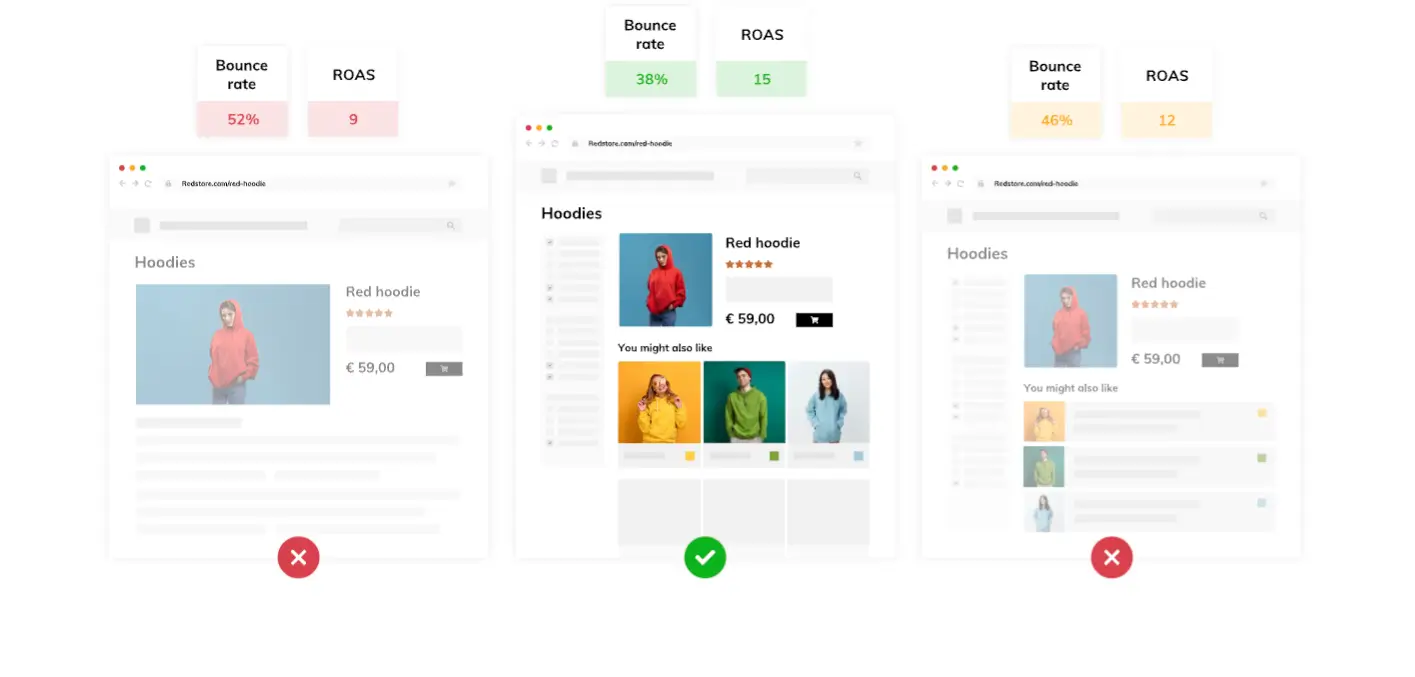
Three different layouts tested with a clear winner using Verbolia.
See Verbolia product recommendations engine in action for a Google Shopping campaign at Bricoprive
2. Involve.me
Involve.me allows you to provide the best products for your customers using Quizzes.
Involve is focused on customer data collection in the shape of forms and surveys and one of its applications is recommending products to visitors or customers based on their answers.
Involve helps customers find the perfect products on your online store by simply asking them.
Top 5 features we love of Involve product recommendations
- Code-Free Quiz Creation: Involve offers no-code creation of interactive quizzes. You can simply drag and drop content elements, add branding, questions, images, modify fonts, etc to build engaging quizzes quickly.
- Personalized Recommendations: With Involve.me, users can provide personalized product recommendations to customers based on their quiz responses. This feature helps you to increase sales by guiding customers to products that best fit their needs and preferences.
- Customizable Embedding: You can embed quizzes on your eCommerce with designs that match your brand. Any format is available: Popups, in-window, iframes, etc.
- Ready-to-use Quizz Templates: You do not even need to think about the quiz workflow, they have more than 300 professional form templates for product recommendations, lead qualification etc.
- AI assistance: If the templates are not enough for you, just check their AI quiz builder for product recommendations (or for anything else): involve.me/ai. Add your domain, describe what you want to achieve, and voila: you got your fully branded quiz. Super cool feature.
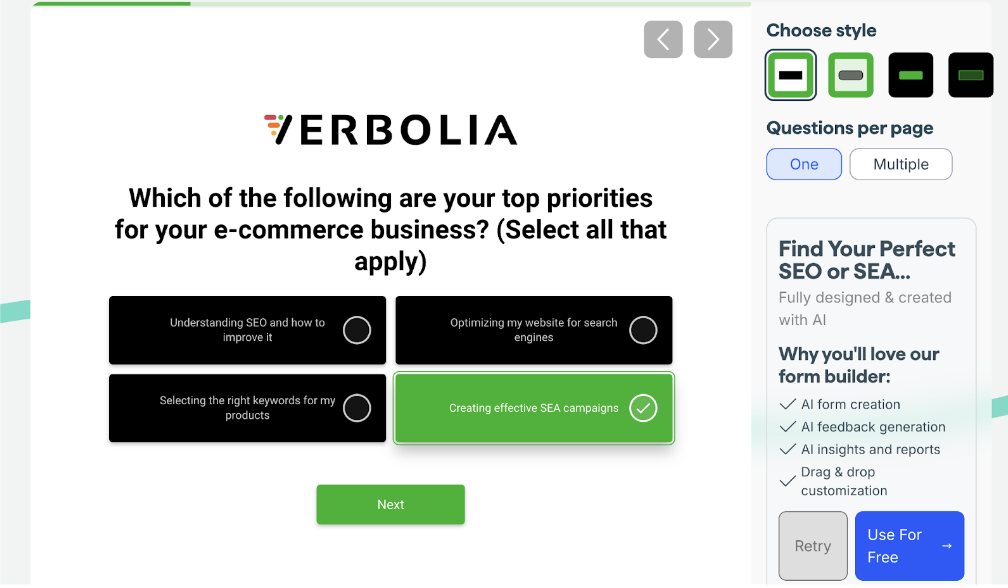
An example of quiz that we’ve created using Involve.
Involve Cons
- Limited Customization: Despite its wide range of templates and design options, complex layouts or workflows might be limited compared to other form builders such as Typeform or SurveyMonkey.
- Limited Integrations: You may encounter issues when integrating the tool with other platforms. For example, your CRM, so you can send quiz data directly. An integration issue example is with Pipedrive, which is not 100% operational.
Reviews
Involve scores 4.7 out of 5 in G2
Price
- Involves has a freemium plan with pro features starting at 29 USD/m
Involve.me Alternatives
💡 Check the best tools to AB test your landing pages
3. Clerk.io
Clerk is a great tool for product recommendations in your online store. It comes with a search feature, an audience builder and an email system that once all integrated uses your visitors and customers’ data to provide a tailored experience.
Clerk does not only use the current visitor’s behavior data but it bundles all customers, orders, email opening rates, clicks rates, etc. to feed its algorithm. Clerk integrates easily with most eCommerce platforms such as Shopify, Magento, or WooCommerce.

An example of the functionality offered by Clerk.io
Top 3 Clerk product recommendations features
- Prebuilt Recommendation Logics: Clerk.io has prebuilt smart logic. The “logic” is the way, format, and moments your products will be shown. For example,
- If the product is out of stock then show alternative products.
- If the user is returning, show “recommended for you”.
- Filters & Rules: You can customize the recommended product listings. Some options are for example: Price, age, or product attribute combinations. These rules allow you to get the right products in front of the right people.
- Customizable Templates: All Clerk recommendation templates are drag-and-drop (WYSIWYG) but you can switch to the HTML/CSS overview to code your templates as you wish.
Disadvantages of Clerk
- Intensive Monitoring: It requires much attention to make the tool actually drive results. It is not only to install it and you forget about it. There is a lot of optimization, tweaking, and upgrades that need to be done. It becomes kind of like a new channel to manage.
- Extra Development needed: Its integration can be challenging which will require extra hands from developers to get Clerk up and running as it should. Bad implementation issues might leave the tool completely useless.
Reviews
Clerk.io scores 4.8 out of 5 in G2
Price
Pricing must be requested.
Clerk alternatives
4. Emarsys
Emarsys provides a product recommendation in most e-commerce communications channels: Not only via the website but also in emails, mobile apps, mobile push notifications, SMS, or even direct post email.
It relies on 1st party data, meaning that it will collect data directly from your current channels (website, app, email, CRM, etc) and merge it all together to get a tailored experience for your webshop customers.
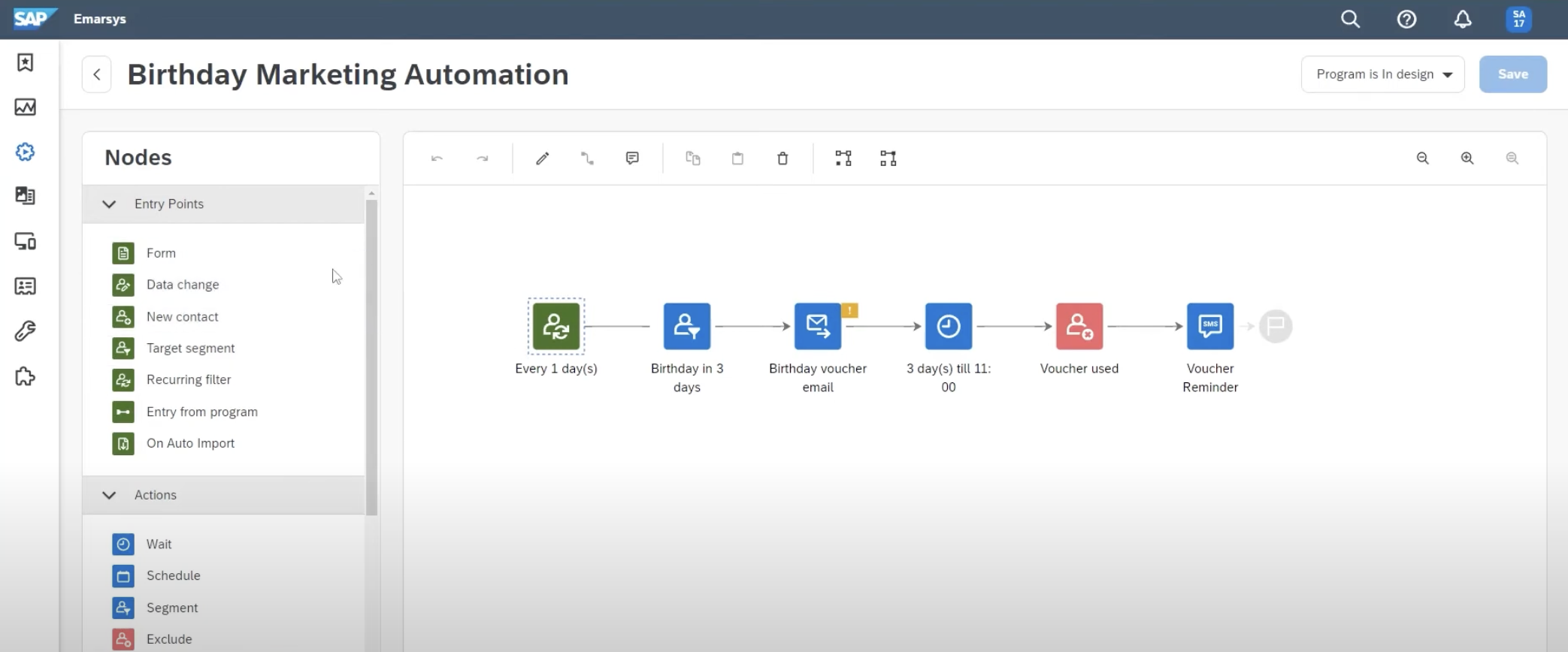
Top 3 pros of Emarsys’ product recommendations engine
- AI Customer Segmentation: As Emarsys collects data from multiple sources (even its own data layer), it enables you to better understand customer behaviors, and deliver hyper-tailored communication with your customers. Emarsys’ AI-assisted dashboard helps you to segment and prioritize your audience. For example, you will be able to group your audience by purchasing intent or predict its potential revenue.
- First-Party Data: Emarsys’ first-party data sources include demographics, sales, and behaviors. Emarsys also provides an integrated data layer that enriches customer data with AI-driven insights. You can integrate all your data points to Emersys, so it is a mix of customer insights with the plus you can act on them.
- Omnichannel: You won’t be limited only to your website either an online store popup, a direct email or a mobile notification, Emarsys can manage every communication point with your audience. Imagine sending personalized leaflets based on customer behavior, with Emersys you can.
Disadvantages of Clerk
- Missing Analytics Views: For example, a dashboard to monitor new customers or registrations is not available so the initial purchasing point of your customers might be missed on your entire strategy. Also, it misses a tracking of their current journey stage, so you might not understand if they are early customers or returning ones.
- Dashboard complexity: Especially for campaign overview. You might find it difficult to identify and oversee the campaign’s planning.
Reviews
Emarsys scores 4.3 out of 5 in G2
Price
5. Salesforce
Salesforce is using its eCommerce Cloud Einstein native solution to leverage AI in customer interactions. For example, with chatbots or live chats, the visitor could get the most suitable recommended products.
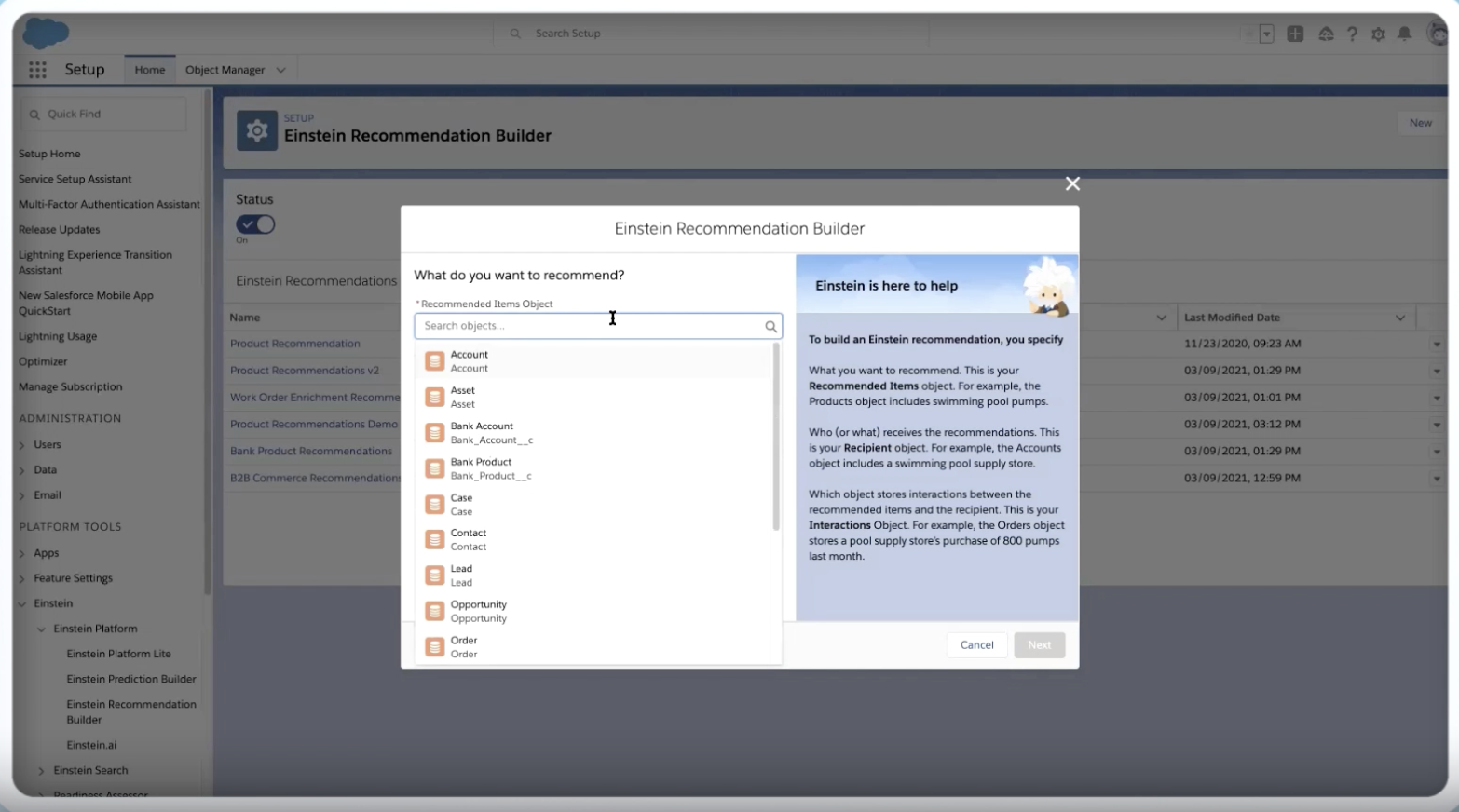
Salesforce’s Einstein tool dashboard.
Top 3 Benefits of Salesforce’s Product Recommendations Engine
- Personalized Recommendations: Salesforce’s product recommendations engine comes with advanced AI algorithms to analyze customer behavior and preferences, so the recommended products are individual per shopper.
- In-Chatbot Product Recommendations: The product recommendations engine provides product suggestions not only in the product pages but also in chat conversations. Either with a live chat agent or in an AI chatbot window, your online store visitor will get the right advice to make the right purchase. These in-chat product recommendations work quite well to increase conversion rates and maximize average order value.
- Seamless Integration: Salesforce’s product recommendations engine seamlessly integrates with your existing e-commerce platform, yet it works best when you are using the native eCommerce platform of Salesforce itself. The product recommendations can be embedded within product pages, cart pages, or email marketing campaigns, and you can customize them at your wish.
Salesforce’s Cons
- Limited Design Capabilities: The product recommendations layout might be limited in terms of flexibility. For example, you might be unable to customize the layout or styling of recommendation widgets to match your brand standards or specific design requirements.
- Detailed and Confusing Reporting: The Salesforce recommendation engine could be too complex for some and therefore confusing. For instance, you or your team may struggle to extract actionable insights as there are many layers of detailed analytics which makes it difficult to make a decision.
- Lack of Robust Features: You might need better reporting, or additional features, and easier API integration to be able to build much more complex solutions like connecting your reports data to other platforms (CRMs).
Reviews
Emarsys scores 4.3 out of 5 in Gartner Peer Insights
Price
- Involves has a plan starting at 50 USD/m
Salesforce alternatives for product recommendations:
💡 Boost your conversion rates with this CRO Tools
6. Nosto
Nosto provides AI-powered & real-time product recommendations for eCommerce. Nosto integrates other customer personalized experience features such as business intelligence, personalized search, or custom pop-ups so you can provide the most custom experience for your online store visitors.
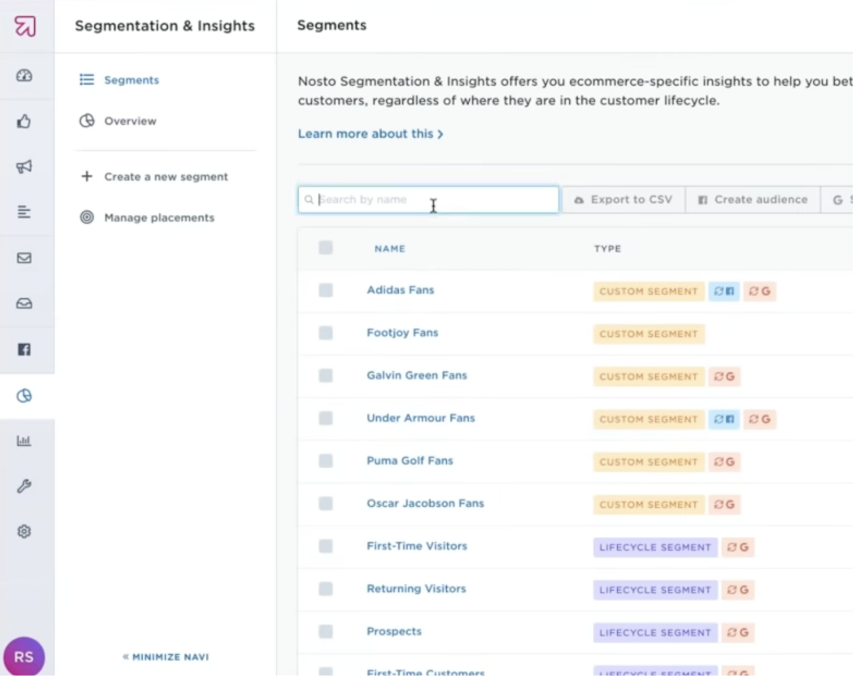
Nosto’s segmentation tool.
Top 3 Benefits of Nosto’s Product Recommendations Engine
- Personalized product recommendations: Nosto uses predictive AI to offer hyper-personalized product recommendations, taking real-time behavioral and transactional data. The recommended products are very dynamic following trends and individual behavior.
- Customization and control: With Nosto you can customize all recommendations so you can embed cross-selling blocks, unique personal recommendations, alternative products, “purchased together” listings, etc. You can tweak product recommendations based on brand or price and also based on product performance metrics such as conversion rate, margin, and stock level.
- Simplified deployment and management: Nosto has a user-friendly dashboard that simplifies the process of creating and editing product recommendations. This ease of use reduces the time required for deployment and allows businesses to manage recommendations efficiently.
Here’s an example of Nostos’s audience segmentation tool for showing each group the best product recommendations based on their data behavior and history. (Source: https://www.youtube.com/watch?v=ia0yODe7i2Y)
Nosto’s Cons
- Difficult implementation: Nosto will require in-house technical expertise in your company to be able to do the right implementation and integrate it correctly with your eCommerce.
- Dashboard complexity: It gets difficult even overwhelming for new users to overview all the product recommendations, placements, and performance. Nosto has documentation you can use.
Reviews
Nosto scores 4.6 out of 5 in G2
Price
Nosto Alternatives
7. Qubit (Part of Coveo)
Qubit is now part of Coveo’s product recommendation engine, and it leverages advanced machine learning to deliver highly personalized product AND content suggestions (yes, not only products).
Coveo uses user behavior and semantic context to understand the intent and needs of the user so it can offer accurate recommendations for your visitors.
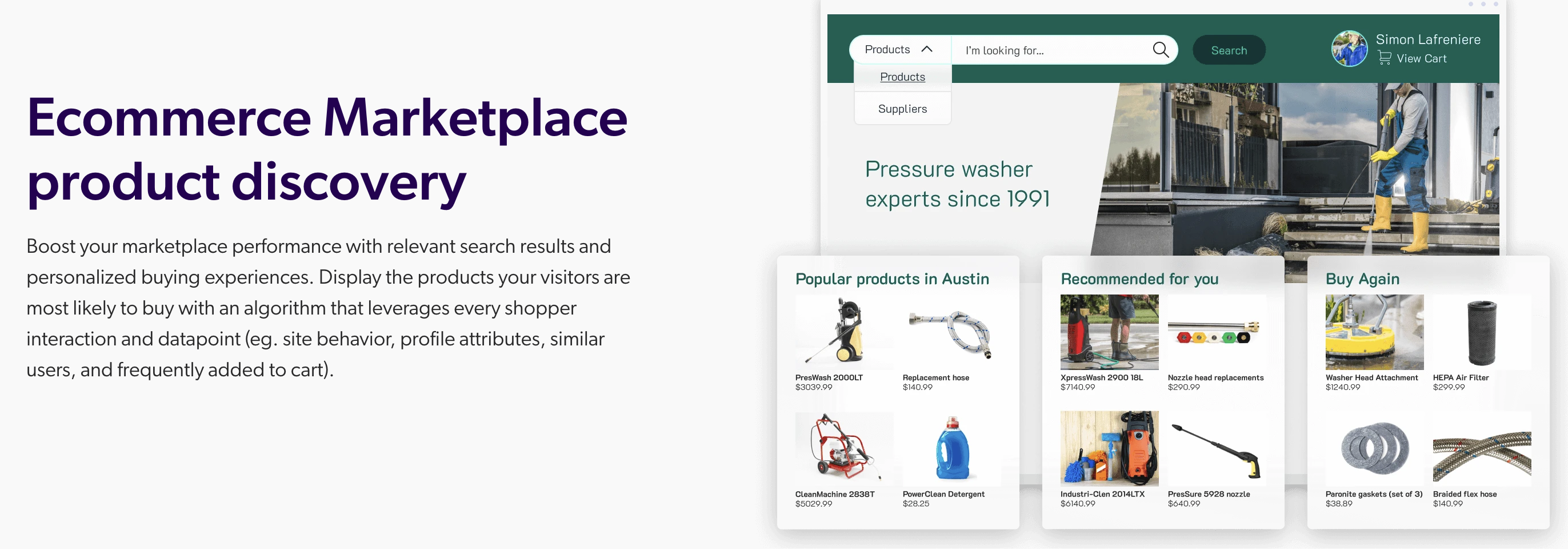
An example of Qubit’s features.
Top 3 Benefits of Qubit’s Product Recommendations Engine
- Context-Aware Recommendations: Coveo’s recommendation engine uses AI to understand the user’s journey, intent, and history and it mixes all together to offer recommendations pre-purchase and post-purchase, to increase not only conversion rates but also customer retention rates.
- Ready-to-Go Machine Learning Models: Coveo has multiple algorithms you can choose to be applied in your online store including: interest-based, frequently viewed and bought together, and popular items. All models are ready to use with a few clicks.
- No-code Dynamic Placement: We find this one the best feature of Coveo, as opposed to other product recommendation tools, where you have to manually place the code where your product listing will appear, Coveo has visibility rules where you can indicate where the recommendations have to be placed without the need of frontend development.
Qubit’s Cos
- Limited integrations: You might not be able to integrate the data from Coveo into other analytics tools for centralized performance e-commerce data.
- Complex dashboard and platform: As it comes with many features it gets complex to manage, which can also lead to issues in the implementation leading to, for example, broken product listings.
Reviews
Qubit scores 4.3 out of 5 in Crozdesk
Price
Pricing must be requested with a separate request.
8. Dynamic Yield
Dynamic Yield offers not only an advanced product recommendation engine, but this solution also offers an entire customer experience personalization engine: You will be able to offer tailored products and solutions, unique content, personalized offers, information, pop-ups, emails, etc. across multiple platforms during the whole customer journey.
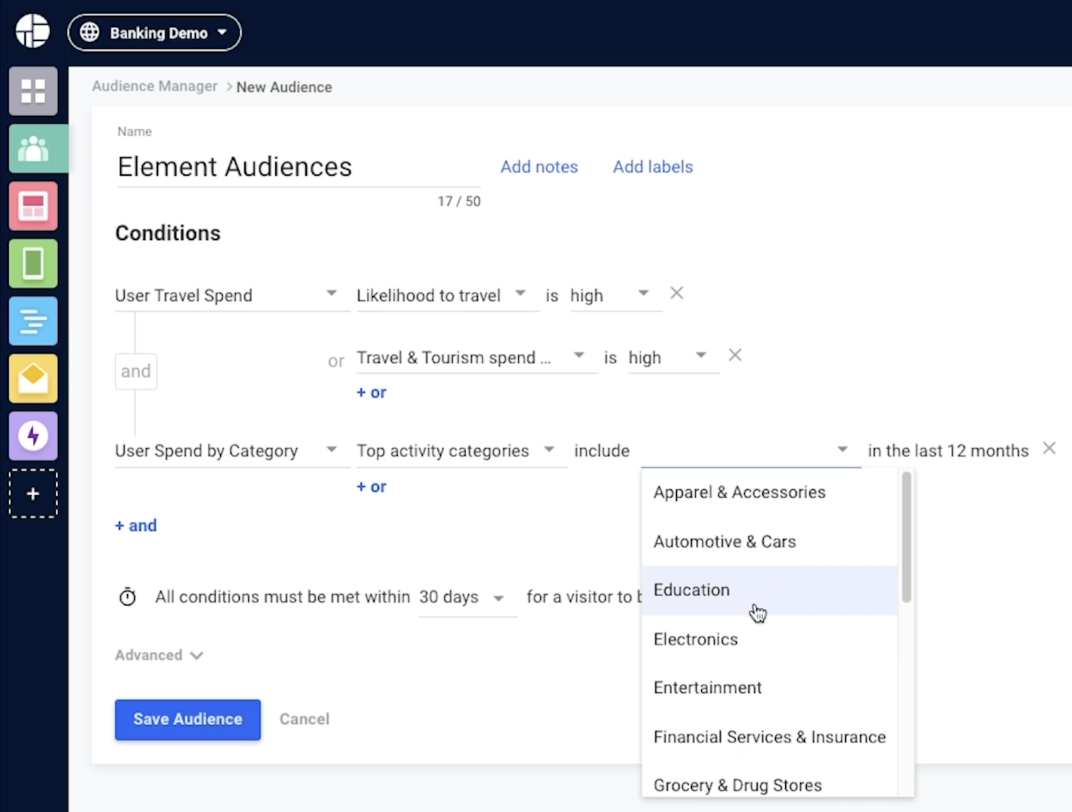
Element unique Proprietary Mastercard purchasing intent data in Dynamic Yield for product recommendations. (Source: dynamicyield.com)
Element unique Proprietary Mastercard purchasing intent data in Dynamic Yield for product recommendations. (Source: dynamicyield.com)
Top Dynamic Yield personalization platform benefits
- Full Personalization Experience: In Dynamic Yield, you can find personalization tools for the whole purchasing journey of your customers like for example, the AB testing for optimal landing pages, website or mobile app personalization tools (for tailored products, content and information), or email-embedded recommendations.
- Proprietary Recommendations Engine: Using Mastercard’s unique customer data, Dynamic Yield has an engine with predictive models of the purchasing intent of your customers being able to understand parameters such as the “user spend by category” so you can build your audiences not only with 1st party data but also with unique purchasing insights. We found this to be the best and unique feature of Dynamic Yield.
- Integrations Marketplace: Dynamic Yield has a marketplace where you can find 3rd party tools and platforms to connect with and integrate extra functionalities in the Dynamic Yield platform, for example, Typeform to create product recommendations quizzes.
Dynamic Yield Cons
- Dashboard complexity: Despite its robust features, Dynamic Yield lacks an intuitive system for organizing campaigns into cohesive folders. For example, you might find it challenging to quickly locate specific campaigns or group related ones together.
- Limited data export: While Dynamic Yield offers valuable insights through its reports, users face limitations in exporting data. Specifically, certain reports, like audience performance, lack the option to download and export data to external formats such as Excel files.
Reviews
Dynamic Yield scores 4.5 out of 5 in G2
Price
Pricing must be requested with a separate request.
9. Adoric
Adoric is a product recommendation tool tailored for Shopify online stores. Its recommendations include upselling features that could boost your online store revenue by up to 30%.
Adoric includes store visitor gamification such as the “Spin and Win” or the “Falling Gift Game” that incentivizes users to stay longer in the store with a unique experience reducing bounce rates and eventually increasing conversion rates.
Adoric’s top features
- Personalized Product Recommendations: With the Adoric product recommendation engine you can display best-selling and most viewed product suggestions on the homepage, category page, or product details page so you can engage first-time visitors. For example, showing trending products to new site visitors.
- Upsells and Cross-sells: You can increase product discoverability by suggesting “also purchased” products on the product or category pages. For example, recommending related products such as accessories, complementary products or alternatives during the checkout.
- Lost Sales Recovery: With email marketing flows you can earn back lost customers by sending them targeted messages with their abandoned carts and offering discounts or even alternative products. A campaign example could be sending targeted emails to shoppers who left items in their carts after 24 hours of their initial interactions. You can do this with Adoric.
Adoric’s cons
- Limited Integrations: Adoric delivers its product recommendation tool only on Shopify but it does not have an integration with other relevant eCommerce platforms such as Magento, Salesforce, SAP Hybris, WooCommerce, etc.
- No AB testing: Adoric is mostly a promotional solution, so it serves to incentivize your visitors to make the purchase but it does not have AB testing capabilities to understand which campaigns perform better.
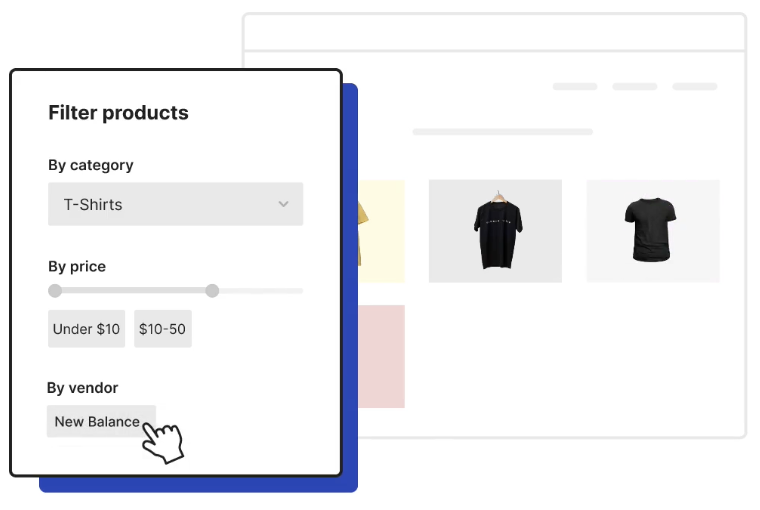
An example of how Adoric allows filtering products to be recommended by price, brand, or category.
Reviews
Adoric’s product recommendation app scores 5 out of 5 in Shopify.
Price
Adoric prices start from a free plan and go up to 70 USD/m.
Adoric Alternatives
10. Personyze
Personyze is an AI-powered platform for website personalization and it offers tools like a content and product recommendation engine, dynamic content recommendations, or cross-channel like website + email.
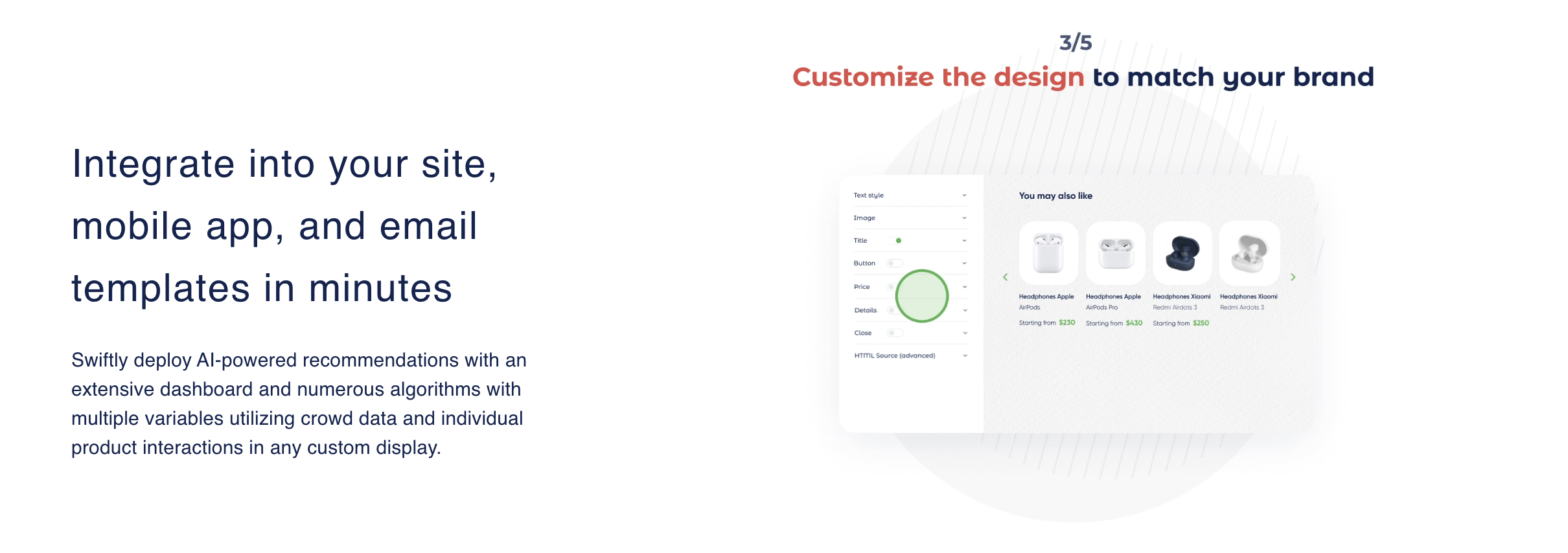
Personyze top product recommendations features
- AI-powered Recommendation Engine: Personyze delivers personalized content and product recommendations with AI technology. It uses all 1st party data available and offers unique content such as “product recommended for you”.
- Dynamic Content Recommendations: You can show real-time, contextually relevant content recommendations. For example, it will use trend data to highlight specific products and push their performance even more.
- Easy Integration: You can deploy Personyze on any website or platform using its REST API and plug-and-play integrations with eCommerce platforms like WordPress, Shopify, or Salesforce.
Personyze’s cons
- Dashboard complexity: For starters, it can be difficult to navigate the campaigns and all the features in Personyze.
Reviews
Adoric’s product recommendation app scores 4.6 out of 5 in Capterra.
Price
Personyze Prices start from a free plan up to 1450 USD/m.
Personyze alternatives
Types of product recommendation engines
Types of Product Recommendation Engines Based on Algorithm Logic
The logic behind product recommendations is based on 1st party data (the customer history data you have in your online store).
- Collaborative Filtering: If the data used for the product recommendations is only about one visitor or customer alone (previous purchases or visited pages for example), we got a Content-Based Filtering engine.
- Content-Based Filtering: If the data used for the product recommendations is coming from multiple visitors or customers (like trendy products for example), we have Collaborative Filtering.
- Hybrid Recommendation System: When the product recommendations are using single user data + all user data, then we have a Hybrid Recommendation System. This hybrid system tends to offer the best and most personalized results.
We listed all these 3 engine recommendations in our listing in this article.
Types of Product Recommendation Engines Based on Technique
- Rule-Based Product Recommendations: it works like product or user categorization. You set product listing filtering rules based on specific product features such as size, price or brand. Then you can do the same with user preferences: you can show different products to different users based on their historical data such as order history or previous visited pages or products. For example, showing cheap raincoats to users who previously purchased cheap umbrellas. Think of it as an if/then logic.
- Segmentation-Based Recommendations: when the engines divide users into distinct segments or groups based on shared characteristics or behaviors. For example “frequent buyers”, “occasional shoppers”, or “budget-conscious shoppers”. The recommendations engine will then show the best product matches for each user segment.
- Input-Based Recommendations: these engines work with a question/answer logic. The user can set their preferences actively via a quiz a form or even a game, so the preferences are so clear that the recommendations engine can accurately provide a unique tailored recommendation.
We also listed all these 3 engine recommendations in our listing in this article.
How Recommendation Engines Are Used
Product recommendations are extremely important for lower bounce rates and higher conversion rates. The logic is simple:
- The more personalized are the pages to a particular user, they tend to stay longer, browse further and eventually make the purchase.
- Your Google Shopping campaigns (or similar) will return better profits as the users that land will stay longer (lower bounce rates) and buy more.
- High personalization facilitates also 1st time visitors to return next time.
- Personalization also increases the lifetime value of your customers.
If you are not using product recommendations in your eCommerce you are definitely missing revenue.
Think about your favorite tool or website. Why are they your favorite? There is a high chance that your answer is “personalized content”. Your customers want the same: tailored products.
Product recommendations for paid shopping campaigns
- Improve campaign profits: One of the most painful issues in paid campaigns like Google Shopping or Facebook eCommerce campaigns is the high bounce rates. eCommerce relies heavily on traffic coming from paid channels and the best way to improve results is with hyper-personalization of the landing page. Users will tend to buy products that are tailored to their needs.
- Use 1st-party data: Your store has enormous amounts of data about your audience. With product recommendation engines you can use that data for good. Using product recommendation engines will allow you to benefit from all-users data and present the most relevant and tailored results to new users in your online store.
- Long-term customers: Personalized results won’t impact only on the first visit, if the customer experience you offer in your online store is good (personalized), those 1st time users will come next time directly to your website. You won’t need to invest again and again to capture them.
Other recommendation engines
Recommendations engines exists all around the internet:
- Recommendations Engines in E-Commerce: to improve conversion rates with the highest customer experience.
- Recommendations Engines in Social Media: the core of social media is the recommendations algorithm. The more personal results it offers the longer we stay in front of the screen.
- Recommendations Engines in Streaming: Netflix or Youtube are the best examples. Both channels live from the recommendations they offer. Less than 10-20% of the users’ actions in those media giants are searches, most of its activity gets triggered because of great (series, movies) recommendations.
Benefits of Recommendation Engines
- Lower bounce rates: By showing users recommendations that align with their interests and preferences, recommendation engines reduce bounce rates by keeping users engaged and exploring the platform further.
- Driving conversions, revenue, and AOV (Average Order Value): Personalized product recommendations in e-commerce platforms can increase the probability of conversion by showing relevant products to users. This could boost revenue and increase the average order value as users are more likely to make additional purchases by picking one or more recommendations.
- Improves customer experience: Recommendation engines make the customer experience better by providing users with tailored content or product suggestions that fit to their individual preferences. Showing relevant product suggestions leads to lower bounce rates and higher conversion rates.
- Increases time spent on the platform: By seeing relevant and engaging content or products, recommendation engines make users spend more time on the platform, exploring additional products and making user engagement metrics better.
- Boosts revenue: The personalized recommendations lead to higher conversion rates and increased sales, contributing to revenue growth for businesses using recommendation engines.
Challenges of Recommendation Engines
- Limited to what they already know: Recommendation engines rely heavily on historical data and user interactions to generate recommendations, which means they may struggle to suggest new products that are not closely related to customers’ interests.
- Can be biased: If recommendation algorithms are not properly designed or monitored, they may have biased data, leading to even discriminatory recommendations.
- Gathering customer data can be tricky: Finding and maintaining high-quality customer data for recommendation engines can be difficult, especially with increasing concerns around privacy and data protection. Ensuring data accuracy, relevance, and compliance with regulations presents ongoing challenges for businesses using some recommendation engines.

